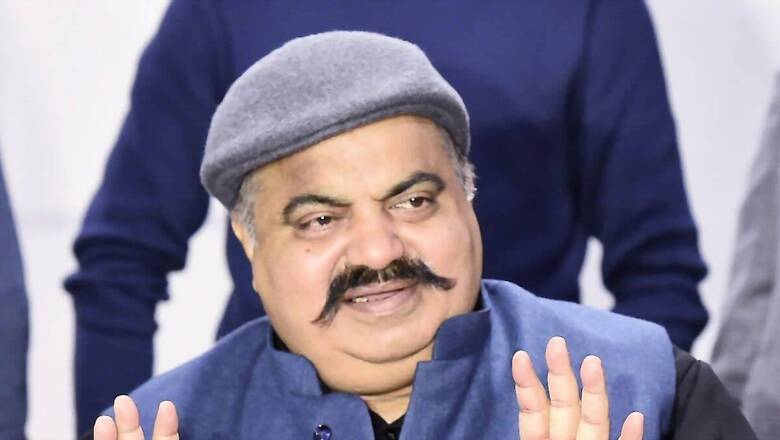
views
There are three kinds of people in the West. The first belongs to a group that doesn’t understand India. Then there are people who don’t want to understand this country and its people. And the third group, a minuscule one, looks up at India with hope and empathy. Unfortunately, it’s the first two groups that invariably set the tone for India in the West. This was evident last week in the manner in which the Western media headlined and covered the killing of a dreaded Uttar Pradesh gangster and his brother. “Atiq Ahmed: Former Indian MP and brother shot dead live on TV,” screamed the BBC headline. Others followed suit.
Yes, Atiq was a former Member of Parliament, but then this lawmaker was actually the sum total of his law-breaker image. Milan Vaishnav begins his 2017 book, When Crime Pays: Money and Muscle in Indian Politics, with a July 2008 exploit of Atiq Ahmed, who was then lodged in jail, to bail out the then UPA government staring at a no-confidence vote over the India-US civil nuclear deal. “Forty-eight hours before the vote and with little fanfare, the government furloughed six of the nation’s most prominent suspected lawbreakers — collectively facing over 100 cases of kidnapping, murder, extortion, arson and more — so that they could fulfill their constitutional duties as lawmakers.”
If one thought that the BBC highlighting Atiq’s lawmaker part at the expense of his lawbreaker image was an act of ignorance, then this notion needs urgent revisiting. For, the BBC soon came up with another report, this time by its “Women and Social Affairs Editor”, which got the headline right by calling him “an Indian mafia don-turned-politician” but the content of the article was even more skewed than the first one. The report projected Atiq as “Robin-Hood” and “a Dr Jekyll and Mr Hyde type of character” who would help the poor, provide them with school fees, assist them during family weddings, and also give them money during Eid. “But this persona,” the BBC Editor emphasised, “unravelled with mounting accusations of heinous crimes.”
Interestingly, while the BBC used the term “accusations” while listing out Atiq’s heinous crimes, thus putting in an air of ambiguity in the matter, no such operative words were used while mentioning his ‘social works’.
This BBC style of reporting has become a template for other foreign media houses. Al-Jazeera, for instance, while maintaining a BBC-like tone and tenor on the Prayagraj killings — even the headlines were similar (‘Ex-MP Atiq Ahmed, brother shot dead on live TV in India) — added communal colours to the entire episode. It reported that the three “suspects quickly surrendered to the police after the shooting with at least one of them chanting ‘Jai Shri Ram’, or ‘Hail Lord Ram’, a slogan that has become a battle cry for Hindu nationalists in their campaign against Muslims”. In the following lines, Al-Jazeera again reminded the readers that the “two victims were from India’s Muslim minority”. And “police did not say whether they were investigating a possible sectarian motive in the killings”.
Other foreign newspapers — from The Guardian and the Daily Telegraph to The Washington Post — almost took the same twisted line, turning the murder of a dreaded gangster into the dastardly killing of a lawmaker, thus putting a question mark on the democratic credentials of the country. The New York Times, for instance, used the opportunity to project “India’s Slide Towards Extrajudicial Violence”. It’s in a way fascinating to see all these newspapers, from different countries with contrasting worldviews, having a common stand on a killing in faraway Uttar Pradesh.
While the Western media tends to use such incidents to project Indian democracy in a bad light, the fact of the matter is these are isolated cases of law and order violations, just the same way the US is facing the epidemic of gun violence. In just four months of 2023, there have been at least 160 mass shootings across the US, leading to the death of 11,523 people (as of 10 April), which on average means about 115 deaths per day. Do we ever question America’s democratic credentials based on these shootings?
Just as the American democracy remains unscathed and unblemished by the gun culture in the US, the Indian democracy today remains as strong as ever. The Western media’s attempt to turn an isolated case of law and order violations into the question of India’s democratic degeneration is as malicious an act as the USCIRF-like institutions invariably clubbing democratic India with communist China, Islamist Pakistan, autocratic North Korea, fundamentalist Saudi Arabia, and terror-infested Syria and Afghanistan. The West’s doublespeak on democracy becomes obvious when one finds all sorts of anti-India forces, from Khalistanis to Islamists, finding refuge in Western capitals!
Vaishnav is spot on when he writes, “India has sustained a nearly uninterrupted commitment to democratic governance for nearly seven decades. Given the odds the fledgling democracy faced at the time of Independence, its survival is no minor accomplishment. In terms of longevity, it is one no other developing country can boast, a distinction made even more admirable when India’s low level of per capita income is taken into account.” He then makes a distinction between the flourishing Indian democracy and its administrative ineffectiveness. “India’s central weakness has been the quality of its state. The mixed capacity of the state to fulfill its most basic functions has meant that the rule of law which exists in practice is at odds with what its Constitution aspires to establish. Democratic accountability has survived largely intact but its form has been disfigured by a high degree of administrative ineffectiveness,” he adds.
It’s reasonable to say that while the Indian democracy has excelled, the Indian administration needs urgent reform. But before being overly critical of the Indian state, one must look at the giant stride it has taken in the last seven decades. At the time of Independence, India adopted universal suffrage. This was despite the fact that the country had just faced the brunt of Partition, was economically impoverished, and was marred by massive illiteracy, with nine out of 10 Indians not even educated enough to read and write. The US, in contrast, took almost seven decades to let non-propertied White men vote in elections. For the same voting rights, the women had to wait till the end of World War I, and the Native Americans and African-Americans till the 1950s and the 1960s respectively.
India’s tryst with democracy, despite all its glitches, criminalisation of politics, et al, should be celebrated, rather than bemoaned. In his book, India: A Million Mutinies Now (1990), VS Naipaul sums up India’s journey beautifully. While conceding how he misunderstood this country when he first arrived here in the early 1960s, calling it “an area of darkness”, with no salvation in sight, he writes, “What I hadn’t understood in 1962, or had taken too much for granted, was the extent to which India had been restored to itself, after its own equivalent of the Dark Ages…” Two decades later, when Naipaul revisited India, he was much more forgiving and understanding. India was amidst a million mutinies then, but he saw these “group excess, sectarian excess, religious excess, regional excess” as “part of the beginning of a new way for many millions, part of India’s growth, part of its restoration”.
The West needs a similar Naipaulian transformation and change of outlook. This won’t be good just for India and the West, but also for world democracy, especially when it is well and truly threatened by China’s hegemonistic designs. The big question, however, is: Will the West, including its media, change? Given the fact that of the three types of people in action in the West, the most powerful and influential seem to be those who don’t want to understand India, the path to change won’t be that easy. The Atiq Ahmed murder case is a reminder to that.
The author is Opinion Editor, Firstpost and News18. He tweets from @Utpal_Kumar1. Views expressed are personal.
Read all the Latest Opinions here



















Comments
0 comment